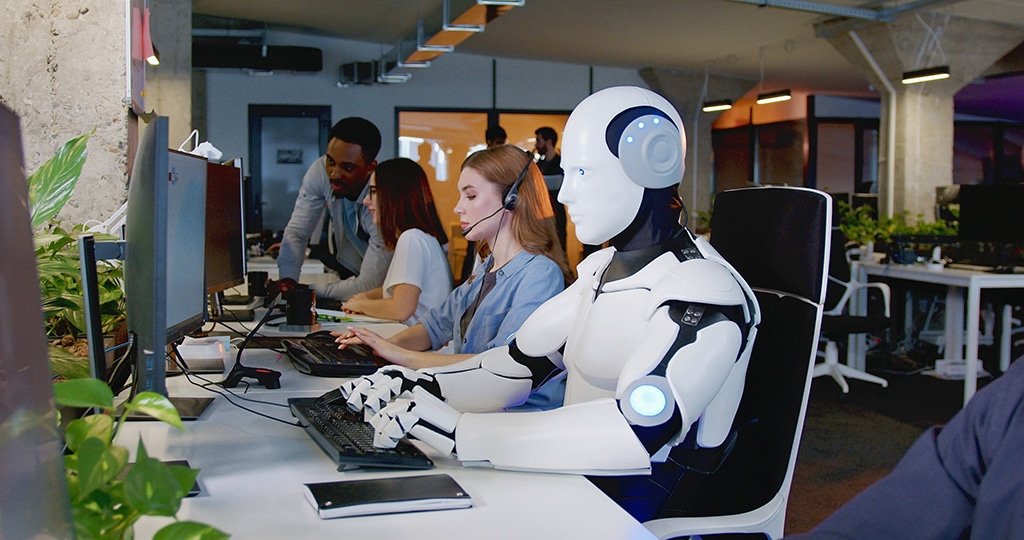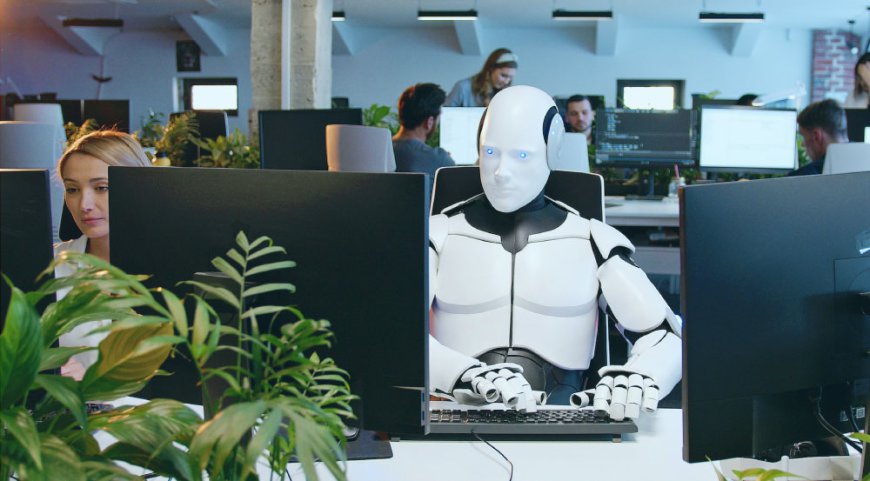Artificial intelligence (AI) continues to shape various industries, and its impact on the workforce is a topic of increasing concern. According to a recent survey conducted by the Organization for Economic Cooperation and Development (OECD), AI has the potential to replace approximately 27 percent of human workers in their current jobs. This survey sheds light on the transformative power of AI technology and raises important questions about the future of employment and the need for proactive measures to address potential challenges.
[caption id="attachment_2925" align="aligncenter" width="1024"]

A robot working along side humans at a computer. The rapid development of AI has raised concerns that it could replace whole sectors of the workforce through automation.[/caption]
The Scope of the OECD Survey
The OECD survey was conducted across member countries and aimed to assess the potential displacement of human workers by AI technology. The survey analyzed a wide range of industries and job roles, including both low-skilled and high-skilled positions. Its findings highlight the significant impact AI is expected to have on various sectors and the need for governments, businesses, and individuals to adapt to this evolving landscape.
AI's Impact on Job Roles
The survey findings indicate that AI technology is most likely to affect routine, predictable, and repetitive tasks that can be automated. This includes positions in manufacturing, transportation, and administrative support, where machines can perform tasks more efficiently and accurately than humans. However, it is important to note that AI is not limited to replacing low-skilled jobs. Even highly skilled professions such as finance, healthcare, and legal services may experience significant disruptions as AI systems become more sophisticated.
Challenges and Opportunities
While the potential displacement of human workers raises concerns about unemployment, it also presents opportunities for reshaping the workforce and creating new jobs. Historically, technological advancements have led to job creation in areas that were previously unimaginable. For instance, the rise of AI technology may lead to the emergence of new industries, the development of AI-related roles, and the need for reskilling and upskilling programs to equip workers with the necessary skills for the future job market.
Also see: tech news latest: Elon Musk Launches AI Startup xAI With Team of Former Google, OpenAI Engineers
Preparing for the AI Revolution
To effectively navigate the AI revolution, stakeholders must take proactive measures to mitigate the negative impact on employment while harnessing the potential benefits. Governments need to prioritize policies that promote workforce adaptability, invest in education and training programs, and foster innovation. Businesses should embrace AI as a tool to augment human capabilities rather than as a direct replacement, and provide resources and support for reskilling initiatives. Individuals should remain proactive in acquiring new skills and continuously adapting to the evolving job market.
Ethical Considerations and Social Impact
As AI technology becomes more integrated into the workforce, ethical considerations and social impact must also be carefully examined. It is crucial to address issues such as data privacy, algorithmic bias, and the ethical use of AI in decision-making processes. Transparency and accountability should be central to the development and deployment of AI systems, ensuring fairness and trust in their implementation.
Conclusion
The OECD survey's findings serve as a reminder that the transformative power of AI is rapidly reshaping the world of work. As AI technology advances, it is essential for governments, businesses, and individuals to collaborate in navigating this changing landscape. By embracing proactive measures such as reskilling programs, fostering innovation, and addressing ethical considerations, society can harness the potential of AI while ensuring a smooth transition for workers into the jobs of the future. The challenges posed by AI are significant, but with strategic planning and a focus on human-centric solutions, we can embrace the opportunities it brings and shape a future where humans and AI work in harmony.
Also see: education news india
Follows Us for More Updates
Like Us on Facebook Page: Click Here
Like Us on Instagram: Click Here 
 A robot working along side humans at a computer. The rapid development of AI has raised concerns that it could replace whole sectors of the workforce through automation.[/caption]
A robot working along side humans at a computer. The rapid development of AI has raised concerns that it could replace whole sectors of the workforce through automation.[/caption]
 A robot working along side humans at a computer. The rapid development of AI has raised concerns that it could replace whole sectors of the workforce through automation.[/caption]
A robot working along side humans at a computer. The rapid development of AI has raised concerns that it could replace whole sectors of the workforce through automation.[/caption]




























